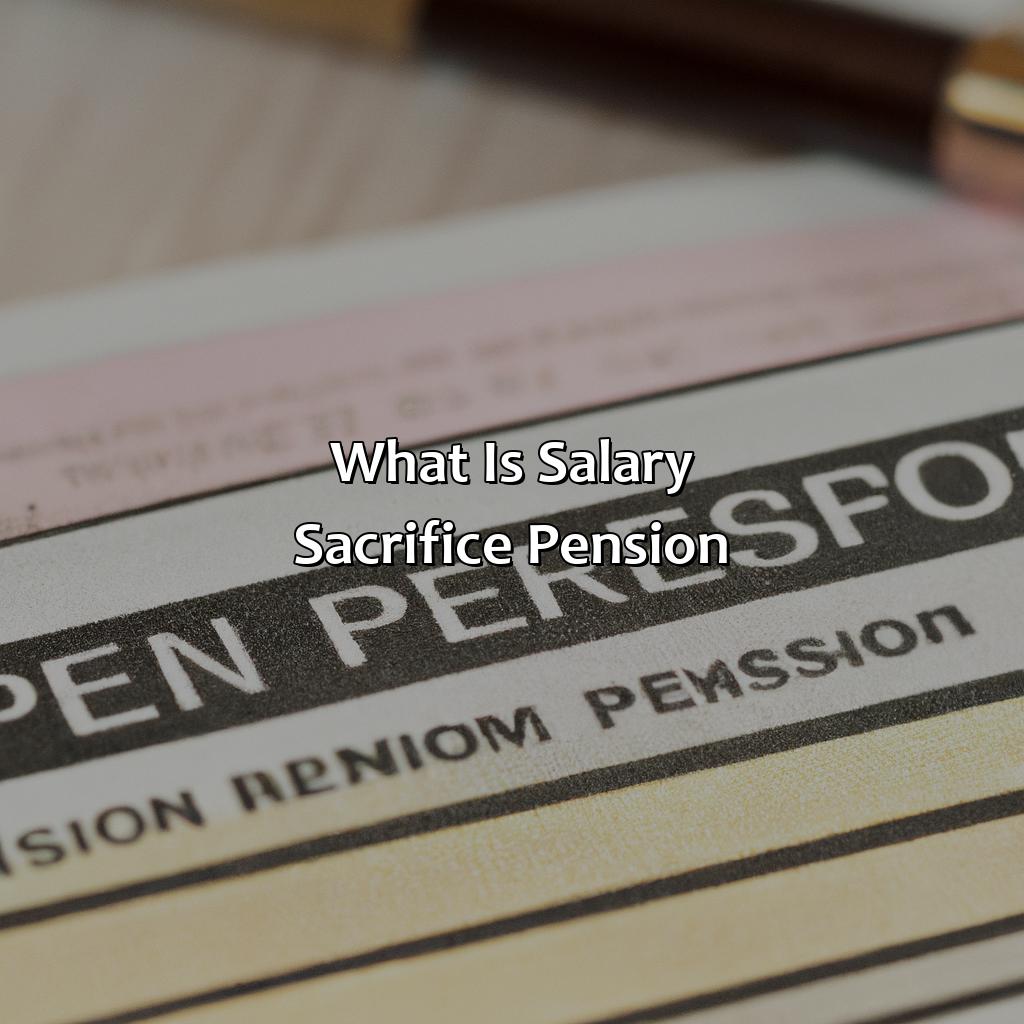What Is Salary Sacrifice Pension?
Key Takeaway:
- Salary sacrifice pension is a method of saving for retirement where an employee agrees to give up part of their salary in exchange for increased employer contributions into their pension fund.
- This arrangement can result in significant tax benefits for both the employee and employer, as the employee’s contributions are made before income tax and National Insurance are deducted, and the employer can save on National Insurance contributions.
- To qualify for a salary sacrifice pension, employees must meet specific eligibility criteria, including age and minimum salary requirements. While salary sacrifice pensions offer advantages such as long-term savings and lower tax liability, they may also result in a reduction in take-home pay and a decrease in state pension entitlement.
Do you want to secure your future financially? Salary sacrifice pension scheme is a great way to do it. It helps you build up a pension pot quickly and comes with tax-free benefits. Read on to find out how it works and the benefits it has to offer.
Definition of Salary Sacrifice Pension
A Salary Sacrifice Pension is a type of workplace pension where an employee agrees to give up a portion of their salary in exchange for increased pension contributions from their employer. This arrangement can provide tax and National Insurance savings for both parties. However, it is important to carefully consider the potential impact on take-home pay and entitlement to State Benefits. It is recommended to seek financial advice before making any decisions regarding Salary Sacrifice Pensions.
In addition to tax advantages, Salary Sacrifice Pensions can also provide higher retirement income, especially when combined with other savings and investment plans. It is important to note that once the agreement is in place, it is difficult to change the amount sacrificed without some significant consequences. Employers also need to ensure they are providing clear and accurate information to their employees about the benefits and risks of Salary Sacrifice Pensions.
Don’t miss out on the potential benefits of a Salary Sacrifice Pension. If you are considering this option, seek advice and carefully weigh the pros and cons before making a decision. Taking control of your retirement savings now can lead to a more secure financial future.
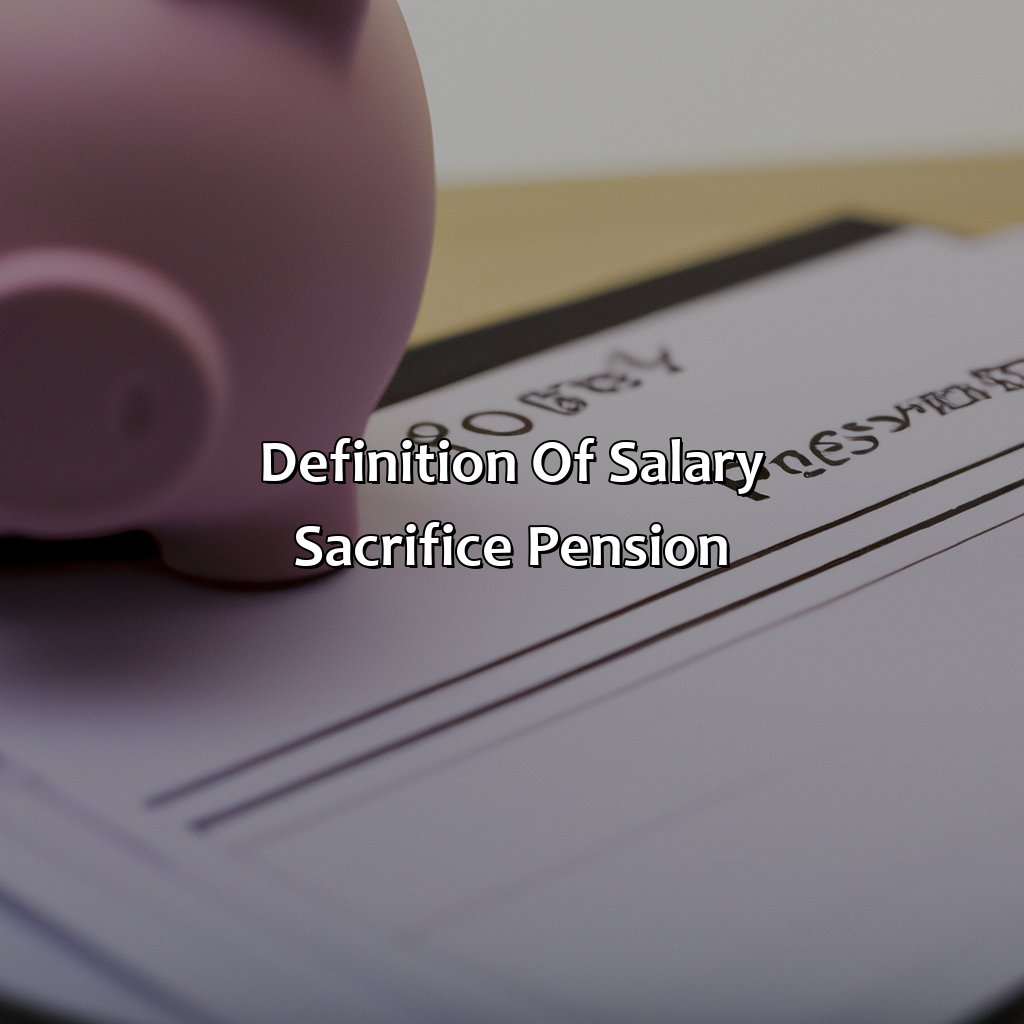
Image credits: retiregenz.com by Adam Duncun
How Salary Sacrifice Pension Works
Grasping How Salary Sacrifice Pension Works and what its advantages are, requires understanding Employee & Employer Contributions. Plus, the Tax Benefits of Salary Sacrifice Pension.
These two parts will explain how much each party can chip in. As well as how it can cut down on taxes for the employee and help them save up for retirement.
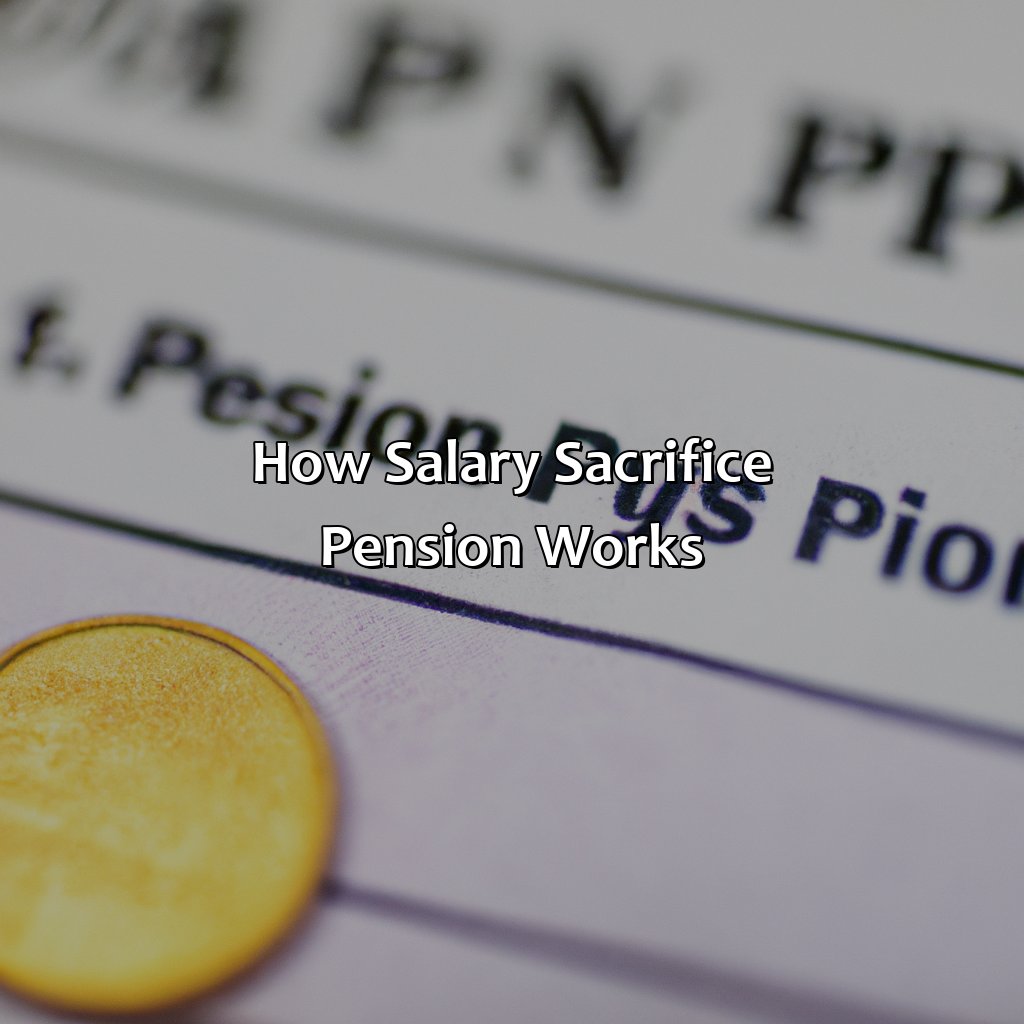
Image credits: retiregenz.com by Harry Woodhock
Employee and Employer Contributions
When it comes to contributions, jointly taking part in a pension scheme is paramount in securing financial stability in the future. Here’s how employers and employees jointly contribute towards their pensions.
- Employee Contributions: Employees often opt-in for a salary-sacrifice scheme where they voluntarily elect to receive less pay but have this amount redirected towards their pension.
- Employer Contributions: Employers must also provide contributions towards employees’ pensions, either minimum or higher as per the company’s pension policy.
- Tax Relief – Employees are eligible for tax relief on their contributions based on personal circumstances such as earning amounts and age.
- Salary Sacrifice – By foregoing a portion of salaries, employees can save significantly on National Insurance (NI) contributions while transferring their net pay into pension plans via salary sacrifice non-taxable schemes.
- Pension Scheme – Employees must choose which plan to join with pre-set rules on how much and when employer/employee shares should be added.
- Pension Consolidation – There is no fixed time-frame; therefore, employees may combine or switch between different schemes over their working lifetime to enhance overall savings accumulation.
It’s important to understand that although the employer contributes money into an employee’s pension account, this still counts as part of the employee’s overall remuneration package and is subject to tax.
Imagine you are an employee named Rachel. As she considers her future salary request from her employer John. Her firm invested 15% of payroll into her colleagues’ retirement accounts every year. If you’re curious about retirement funds, you may also want to know about pension debt and what it means for your financial future.
Determined, Rachel discussed how substantial this contribution was to consider substituting some of her salary with extra premiums into a 401(k). When she requested this package from her manager John, he readily agreed since that had always been his strategy too for any long-term worker who wished additional benefits through saving costs as per unique circumstance a win-win situation for each employee and the company as well.
The only thing better than a good retirement plan is a good retirement plan with tax benefits…kind of like finding a $20 bill on the street and realizing it’s tax-free.
Tax Benefits of Salary Sacrifice Pension
Salary Sacrifice Pension provides various Tax Benefits, which can significantly increase your retirement savings. Here are some ways in which you can benefit from salary sacrifice pension:
- Reduced Income Tax: As your pension contributions are taken from your pre-tax salary, you pay less income tax now. This leads to increased take-home pay and greater savings towards your retirement.
- No National Insurance Contributions: As your pension contributions are taken from your pre-tax salary, you do not pay National Insurance contributions on that amount. It leads to additional savings for your retirement.
- Saver’s Credit: By contributing more into a pension through salary sacrifice, you may be eligible for Saver’s Credit – a government scheme aimed at supporting those on lower incomes to save towards their retirement.
It is worth noting that employers also benefit from providing salary sacrifice pension schemes as they pay less National Insurance contributions on employees’ reduced salaries.
Additionally, maximising your pension contribution through a Salary Sacrifice Pension is a smart way of enhancing your retirement funds and reducing tax liability.
Act now and speak to your employer today about the benefits of S Pension. Don’t miss out on the opportunity to secure a financially sound future!
Want to sacrifice your salary for retirement? First, make sure you’re eligible – and not just for early bird dinner specials.
Eligibility for Salary Sacrifice Pension
Do you meet the criteria for a salary sacrifice pension? Age and salary levels are two must-knows to see if you qualify. Age requirement and minimum income level are two key sub-sections to see if you can get this pension plan.

Image credits: retiregenz.com by James Duncun
Age Criteria
Considering the chronologic age and other factors, individuals become eligible for a salary sacrifice pension plan. As per industry standards, most companies offer this benefit to employees over the age of 22, who earn a minimum salary of 10,000 per year.
Moreover, several other factors can affect an individual’s eligibility for the scheme. These include years of service with the employer, tax status, and employment contract norms. The length of service could begin from three months, ending at two or more years before being qualified for this scheme. If you want to learn more about retirement benefits, you may want to find out what the UK state pension is and how it works.
A crucial aspect to keep in mind while deliberating eligibility is that one has to assess whether this benefit-plans aligns with their career goals. One must carefully consider the financial implications before making any decisions about participating in such plans.
Pro Tip: It’s always advisable to consult a reputable financial advisor or the human resources department about your eligibility before considering enrolling in a salary sacrifice pension scheme.
Why worry about minimum salary requirements when you can just sacrifice your salary for a pension and become a broke retiree with a killer sense of humor?
Minimum Salary Requirements
The salary threshold requirement is a crucial aspect of salary sacrifice pension schemes. To be eligible, employees must earn a minimum wage that enables them to contribute an agreed amount to their pension plan. This ensures that both employer and employee can benefit from the scheme’s tax-efficient nature and increased contributions.
It’s worth noting that minimum salary requirements vary depending on the employer’s discretion and the chosen pension provider. Thus, it’s essential to discuss specific eligibility criteria with both before joining a scheme.
Salary sacrifice pensions have been in existence since 2001 when legislation allowed employers in the UK to offer them as part of their employment benefits package.
In recent years, more employers have started offering these schemes as they encourage greater workforce participation across all income levels and help reduce the burden of National Insurance Contributions for both parties.
Saving for retirement is like preparing for a zombie apocalypse- you need all the advantages you can get, including a salary sacrifice pension.
Advantages of Salary Sacrifice Pension
Choose salary sacrifice pension for major benefits. This scheme lowers tax liability, helps you save in the long run, and offers employer benefits. Here’s why it’s superior. Let’s explore the sub-sections:
- Long-term savings: By opting for salary sacrifice, you will be contributing to your pension fund regularly, which will not only help you build a sizeable pension pot but also ensure financial security in your retirement years.
- Lower tax liability: By sacrificing a portion of your salary towards your pension, you can lower the amount of taxable income, resulting in lower tax payments. This means that you end up saving more with less tax.
- Employer benefits: Many employers offer workplace pension schemes, and some even offer salary sacrifice schemes as part of their employee benefits. By opting for a salary sacrifice pension scheme, you not only benefit from the employer contribution but also benefit from additional tax savings as the contribution is taken from your pre-tax earnings.
Get all the details!
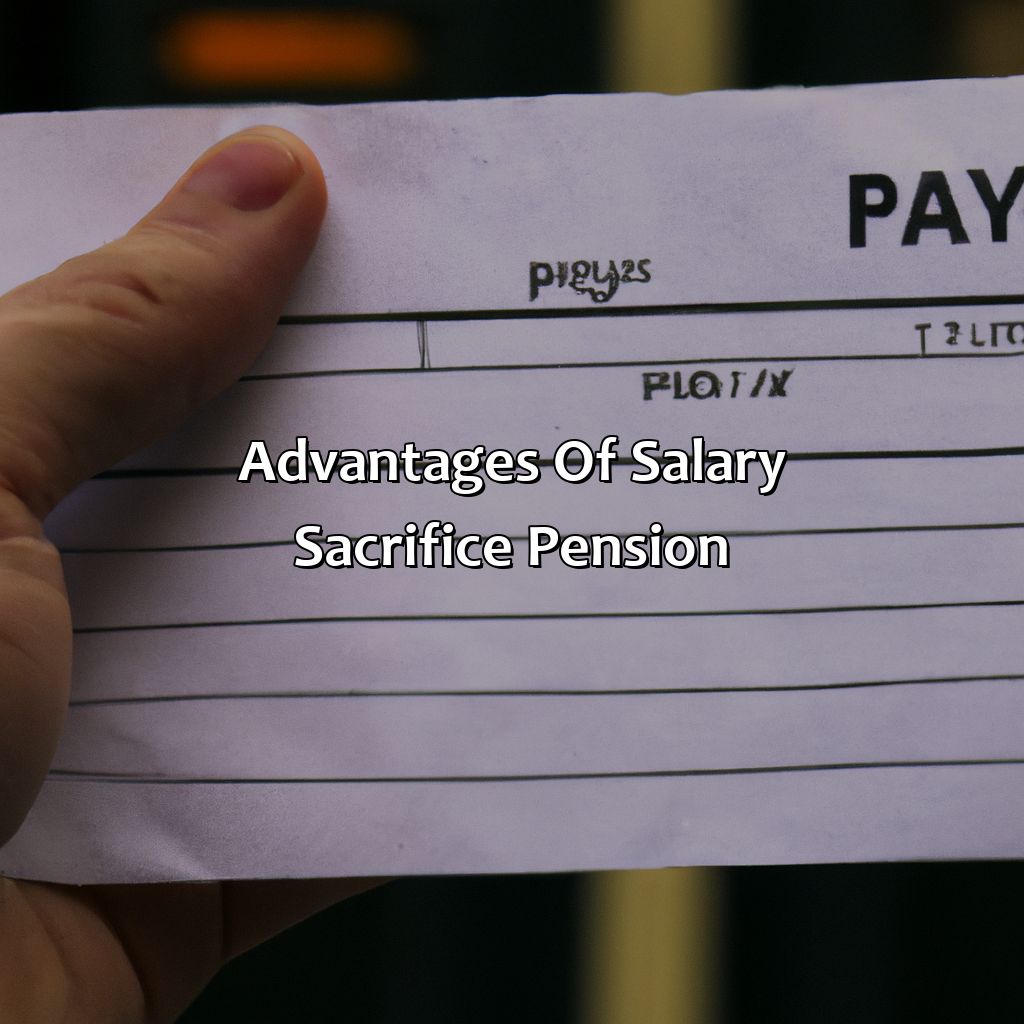
Image credits: retiregenz.com by Yuval Woodhock
Long-term Savings
Investing in a retirement plan with a salary sacrifice pension scheme can lead to long-term financial gains. By deferring part of their salary into a pension fund, employees can reduce their taxable income, increase their contributions and obtain the advantage of compound interest. Over time, these savings will help individuals create a sizable nest egg that they can use during their later years.
Moreover, as employees retain more money in pension funds, less tax has to be paid from their remaining income. This means that even with reduced take-home pay, individuals should be able to live comfortably without having to worry about financial stability in retirement. To learn more about pay as you go pension plans, check out this helpful guide.
It’s important to note that while pension schemes do entail some degree of risk, especially when it comes to investing in stocks and shares-based instruments; however, the government provides guarantees on an employee’s investment up to certain limits. Therefore it is wise for individuals to research and compare various types of pensions before choosing one that best meets their needs. You might have heard of ERS pension on your payslip, which is a form of salary sacrifice pension.
Finally, it is advised that employees should consult an independent financial advisor who is qualified in pensions planning before making any significant decisions. Having access to an expert’s advice is always recommended when dealing with critical matters like long-term investments such as a 70K pension worth.
Who needs a magic wand when you can use salary sacrifice to make your tax liability disappear?
Lower Tax Liability
One notable benefit of participating in salary sacrifice pension is the reduction of tax liabilities. This arrangement allows employees to make contributions to their retirement plan before the deduction of income tax, thus reducing their overall taxable income. By doing so, individuals can potentially move to a lower tax bracket and reduce their tax bill.
Moreover, the reduction of taxable income through salary sacrifice also implies that individuals will pay lesser National Insurance contributions. Employees save money as a result of this process and use it towards increasing their overall retirement saving plan. Learn more about ER pensions and how they can benefit you.
In addition, salary sacrifice pension has been widely adopted by both employers and employees due to its advantages. With the flexibility of payment plans, employees can opt for a higher contribution rate without necessarily reducing take-home pay, allowing them to boost their retirement savings prospects.
Historically speaking, salary sacrifice scheme was first introduced in Australia several decades ago before becoming prevalent in Western Europe and other countries. In more recent years, with many governments aiming to encourage private savings rather than relying on public spending programs, more companies have begun adopting this approach to facilitate better financial wellness plans for their staff.
Your employer gets to save money on National Insurance contributions while you save for a future where you won’t have to work for them anymore- it’s a win-win!
Employer Benefits
There are multiple advantages for employers who offer a salary sacrifice pension scheme to their employees.
- It can serve as an incentive to attract and retain high-quality employees.
- Employers can make cost savings on National Insurance contributions, which are reduced with the implementation of salary sacrifice.
- Contributing to a pension scheme can improve the overall financial wellness of employees, reducing the stress of financial difficulties and improving productivity.
- It demonstrates corporate social responsibility by offering a long-term savings plan for employees.
It is important to note that employers should seek professional advice before implementing such a scheme, ensuring its compliance with laws.
A salient feature worth highlighting is that workplace pensions have been on the rise in the UK in recent years.
For example, A study in 2019 found that there was an increase of approximately 20% in workers enrolled in employer-provided pension schemes since the introduction of automatic enrolment in 2012.
Why choose between a comfortable retirement and a comfortable present when you can sacrifice both with a salary sacrifice pension?
Disadvantages of Salary Sacrifice Pension
To comprehend the downfalls of salary sacrifice pension, be aware of reduced take-home pay and loss of state pension entitlement. To gain insight into the potential detrimental effects of this type of pension plan, read on. These subsections will help you gain a better understanding.
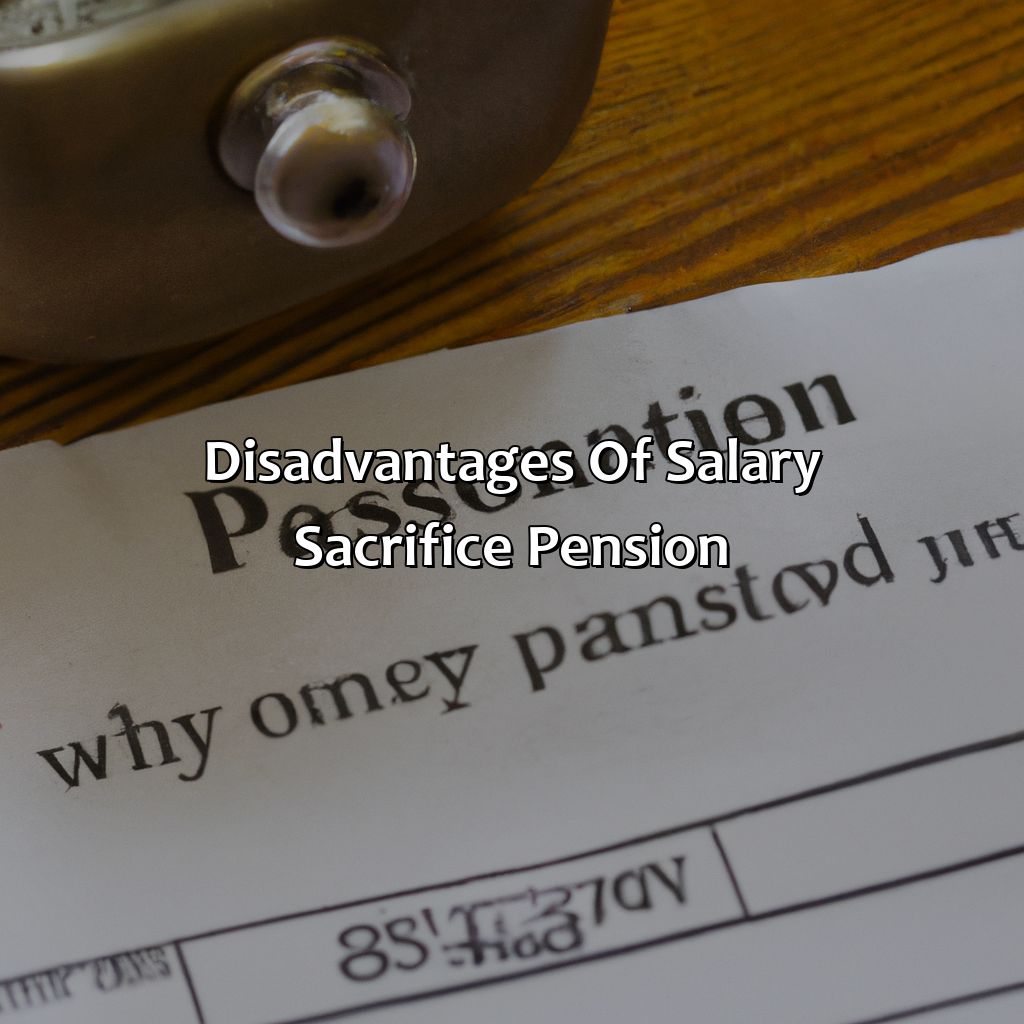
Image credits: retiregenz.com by Harry Arnold
Reduction in Take-Home Pay
Opting for a salary sacrifice pension plan can result in a reduction of the amount you receive as take-home pay. This is because part of your pre-tax income goes towards funding your pension fund. Hence, your net pay after taxes and pension contributions will be lower than it would have been without this type of scheme.
It’s important to note that the amount you contribute to your pension scheme can influence the extent of the reduction in your take-home pay. The more money you contribute, the larger the reduction.
In some cases, employees may also face a decrease in their employer’s contribution amounts toward their pensions, which can further decrease take-home pay for those on lower incomes.
Studies from stockbroker AJ Bell suggest that depending on an employee’s personal circumstances and retirement objectives, alternative pension saving methods could prove more suitable than salary sacrifice schemes in ensuring they achieve their financial goals.
According to AJ Bell, “opting for an occupational pension instead of salary sacrifice plans solely focused on reducing tax liabilities could mean missing out on otherwise available benefits,” such as employer pensions’ money-saving opportunities.
Looks like sacrificing your salary for the future might leave you with a future of sacrificing your daily coffee runs, thanks to the decrease in state pension entitlement.
Decrease in State Pension Entitlement
Salary sacrifice pensions may lead to a reduction in entitlement to the state’s pension scheme. This is because an individual’s national insurance contributions are based on their earnings, and salary sacrifice reduces the amount of salary subject to these contributions. As a result, one may not accumulate enough credits for a full state pension when they retire.
Participating in a salary sacrifice scheme can have long-term consequences on one’s retirement income and net worth. The reduction in National Insurance contributions may not only affect state pension but also reduce the benefit received from other government programmes such as unemployment, maternity pay, and sickness benefits. It is also important to understand what a CETV value of a pension is and how it can impact your retirement planning.
It is crucial to consider all the implications of participating in any voluntary workplace schemes that could affect one’s financial well-being. It is advisable to discuss with an independent financial advisor before making such decisions.
In the past, some businesses had overly aggressive sales tactics when communicating these programmes’ benefits without giving due consideration to employees’ future welfare. Therefore, it is vital for individuals to do thorough research so that they fully understand what they are getting themselves into before signing up for a salary sacrifice pension scheme.
Five Facts About Salary Sacrifice Pension:
- ✅ Salary sacrifice pension involves an agreement between an employer and an employee to redirect some of the employee’s salary into their pension fund. (Source: Money Advice Service)
- ✅ This scheme can result in significant tax savings for both employers and employees. (Source: PensionBee)
- ✅ Salary sacrifice pension contributions are deducted from an employee’s gross pay, reducing their taxable income and resulting in lower income tax and National Insurance contributions. (Source: Gov.uk)
- ✅ It is important for employees to understand the impact of salary sacrifice pension on their entitlements to state benefits, such as the State Pension and Working Tax Credit. (Source: The Pensions Advisory Service)
- ✅ Salary sacrifice pension may not be suitable for all employees and they should seek independent financial advice before making a decision. (Source: Which?)
FAQs about What Is Salary Sacrifice Pension?
What is salary sacrifice pension?
Salary sacrifice pension is a type of retirement savings arrangement where an employee agrees to give up a portion of their salary in exchange for increased pension contributions from their employer.
How does salary sacrifice pension work?
Under a salary sacrifice pension scheme, an employee agrees to reduce their gross salary by a fixed amount each month. The money that would have been paid as salary is then paid directly into the employee’s pension fund, with the employer also contributing their share.
What are the benefits of a salary sacrifice pension?
One of the main benefits of a salary sacrifice pension is that it can help boost retirement savings. By sacrificing a portion of their salary into their pension fund, an employee can benefit from increased contributions from their employer, tax relief, and potentially higher returns.
Who is eligible for a salary sacrifice pension?
Salary sacrifice pensions are typically offered as part of an employee benefits package and are available to all eligible employees. However, it is worth noting that not all employers offer salary sacrifice pensions.
What are the potential drawbacks of a salary sacrifice pension?
One potential drawback of a salary sacrifice pension is that it can result in a reduction in take-home pay, as the employee will be sacrificing a portion of their gross salary. Additionally, there may be restrictions on when and how you can access your pension savings.
How can I set up a salary sacrifice pension?
If you are interested in setting up a salary sacrifice pension, you should speak to your employer to find out if this option is available. They will be able to provide you with more information on the benefits, drawbacks, and eligibility criteria for their pension scheme.
